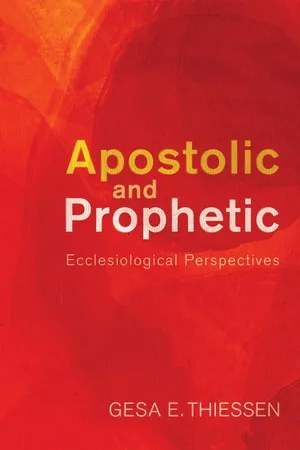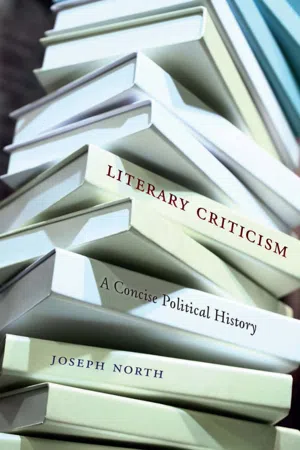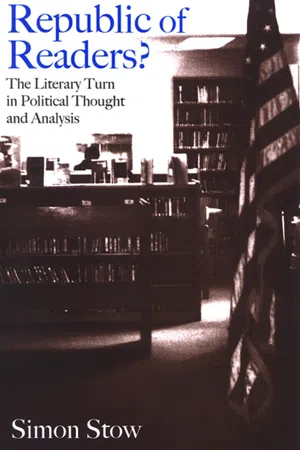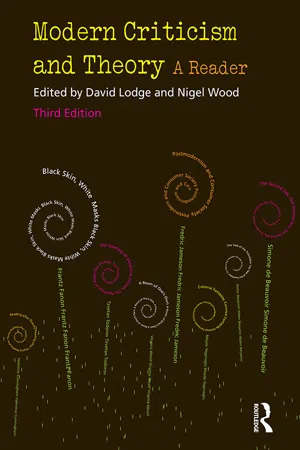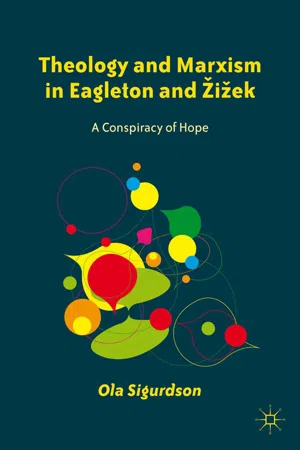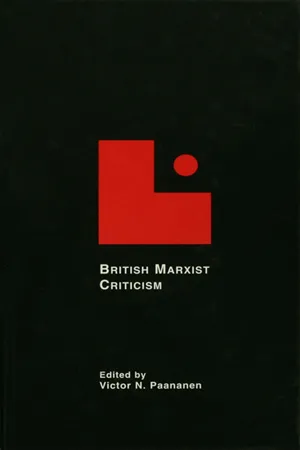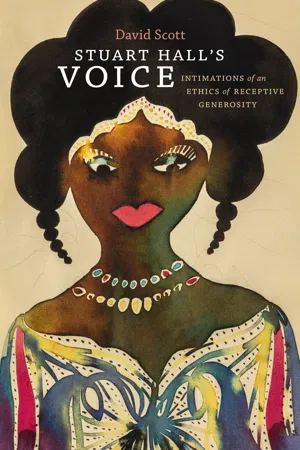Literature
Terry Eagleton
Terry Eagleton is a prominent literary theorist known for his contributions to Marxist literary criticism and cultural theory. He has written extensively on topics such as ideology, postmodernism, and the relationship between literature and politics. Eagleton's work often challenges traditional literary interpretations and seeks to uncover the underlying power dynamics and social implications within literary texts.
Written by Perlego with AI-assistance
Related key terms
1 of 5
8 Key excerpts on "Terry Eagleton"
- eBook - ePub
Apostolic and Prophetic
Ecclesiological Perspectives
- Thiessen(Author)
- 2011(Publication Date)
- Cascade Books(Publisher)
7A New Left Church? Terry Eagleton
IntroductionBorn in Salford, England, in 1943, Terence Francis Eagleton is recognized as one of the most influential literary theorists working today. A third-generation Irish Catholic immigrant in Britain, Eagleton grew up in a working-class environment with strong Republican leanings. Unsurprisingly, his working-class background contributed to a sense of inferiority. However, in his nascent academic career, he worried initially about his roots receding from him, “but then I became rather stoical about it. It was foolish to believe this was a divide that could be simply crossed. I had no illusion that I could turn the clock back . . . But instead what I tried to do was write on behalf of my father’s people.”1Eagleton obtained his MA and PhD from Trinity College, Cambridge. He was a Fellow of Jesus College, Cambridge (1964–1969), a tutorial fellow at Wadham College, Oxford (1969–1989), and lecturer in critical theory at Linacre College (1989–92). Eagleton was appointed Thomas Warton Professor of English Literature at Oxford University (1992–2001), and John Edward Taylor Professor of Cultural Theory at Manchester University (2001–2008). At present, he holds a Visiting Professorship at the National University of Ireland, Galway, and at other universities, including Lancaster, Yale, and the University of Notre Dame.His works—spanning subjects concerning literary theory, criticism, Marxism, colonialism, nationalism, and Ireland—are numerous, comprising not only academic publications, but also two plays, a novel, and a memoir.2While Eagleton established himself as a literary theorist, he has been interested in, and has also critically engaged with Christian theology and the church, especially his own Catholic Church. What might be almost forgotten are his earliest writings from the 1960s, which concern connections between faith, theology/ecclesiology, politics, and literature. Hitherto Eagleton has rarely featured as a discussion partner among theologians. However, with his latest publications, this is now changing. His earliest writings, including amongst others The New Left Church ,3 as well as his recent On Evil 4 and Reason, Faith and Revolution: Reflections on the God Debate 5 —a sharp, witty, polemical response to Richard Dawkins’ and Christopher Hitchens’ militant atheist agenda—invite us to pay new attention to his theological writings and views on Christian faith. In fact, Reason, Faith and Revolution , written over forty years after The New Left Church - eBook - PDF
Literary Criticism
A Concise Political History
- Joseph North(Author)
- 2017(Publication Date)
- Harvard University Press(Publisher)
I will have more to say on the question of their representativeness at the chapter’s close. 82 L I T E R A RY C R I T I C I S M Terry Eagleton Terry Eagleton, Williams’ student, offers us our first and earliest example of what was quickly to become a general tendency. One may summarize the position he took in the 1980s and 1990s by saying that he critiqued the categories of “literature” and the “aesthetic” as elitist mystifications, rejected the associated practice of “criticism” as necessarily Leavisite or New Critical, and recommended the restructuring of departments of literature around the central goal of “education in the various theories and methods of cultural analysis” (186). 1 In other words, his position was that of Williams in Marxism and Literature, without the rider that all of this was to be seen as a provi-sional clearing operation on the way to a reconstruction of “literature” and the “aesthetic” in more materialist terms. We might say that Eagleton’s ver-sion of the argument was the more successful: as I noted in the Introduction, today’s departments of literature are indeed largely structured, not around the concept of “literature” in the old aesthetic sense and the seemingly ide-alist project of its “criticism,” but around “cultural texts” and the seemingly more materialist project of their analysis, without any general sense that this structure should be considered merely a temporary phase in a longer plan. 2 One sees how thoroughly the story of the origins of “criticism” had become muddled by this point when one reads Eagleton’s chapter on “The Rise of English” in his influential Literary Theory: An Introduction (1983), or his treatment of the same in his subsequent volume The Function of Criticism (1984). - eBook - PDF
Republic of Readers?
The Literary Turn in Political Thought and Analysis
- Simon Stow(Author)
- 2012(Publication Date)
- SUNY Press(Publisher)
Indeed, Eagleton’s work is an audacious at- tempt by one of Europe’s most influential cultural critics to expand the fron- tiers of literary analysis. Although the current study evinces serious reservations with the type of politics that literary study sometimes engenders, Eagleton is nevertheless to be congratulated for helping open up literary study to previously marginalized voices and overlooked areas of study. As Valentine Cunningham observed: “Who would not be happy with the way in which theory has not just given a voice to former marginal interests and persons in texts, but has given an affirming voice to critics from, or identifying with, those margins.” 5 Despite being one of the most vocal proponents of the claim that literary theory can give us insight into the political, Eagleton never sets out his method- ological claims in the manner of a Nussbaum or a Rorty. He appears, however, to have two key claims. First, he offers a version of the privileged observer claim, arguing that literature and literary theory offer us a critical perspective on the world outside the text that is unavailable elsewhere. Second, he takes the porta- bility claim as a given: he regards his skills as a literary critic as being equally ap- plicable to all areas of study, textual and nontextual, literary and political. In this, Eagleton seems to provide a model for much of the work on literature now being done in political science and philosophy departments. The extent to which the work of the literary turn consciously mimics Eagleton’s work is unclear. Certainly, few—if indeed any—of its key thinkers cite Eagleton in their work. Neverthe- less, his indirect influence can perhaps be detected in the ways in which many of these figures have adopted his methods and/or his underpinning assumptions about literature and politics. They are, however, assumptions and methods that, this study will argue, are rife with problems. - eBook - ePub
Modern Criticism and Theory
A Reader
- Nigel Wood, David Lodge(Authors)
- 2014(Publication Date)
- Routledge(Publisher)
48 Terry Eagleton
DOI: 10.4324/9781315835488-48Introductory note
Terry Eagleton (1943–) is Professor of Cultural Theory and John Rylands Fellow at the University of Manchester. His career has taken in many visiting posts and a Professorship at Oxford University as well as Fellowships at Wadham, Linacre and St. Catherine’s colleges at Oxford and Jesus College, Cambridge.Eagleton has done more than most in bringing to public notice the practical, cultural and political consequences of Marx’s concepts of dialectical materialism and ideology. His earliest studies in this vein, Criticism and Ideology: a study in Marxist literary theory (1976), Marxism and Literary Criticism (1976) and Walter Benjamin: towards a revolutionary ideology (1981), acknowledge a marked debt to Raymond Williams, although he was more obviously influenced by structuralist and post-structuralist thought. In both the thinking of Williams and Louis Althusser the emphasis frequently falls on the relative autonomy of cultural institutions, where their histories cannot immediately be related to, in Marx’s terms, the base of formal economic relations of value and labour. Within the superstructure (see Introductory note to Marx and Engels, this ed., p. 32), there were significant degrees of difference between simply ‘false’ ideas, deliberate fictions that subjugated individuals to the existing capitalistic social relations, and a rich system of representations, systematic and creative of perhaps alternative ways of perceiving the self in relation to the real basis of social organization. For Althusser, ‘ideological state apparatuses’ were indelibly stamped with an apparently libertarian array of images;In a class society ideology is the relay whereby, and the element in which, the relation between men and their conditions of existence is settled to the profit of the ruling class. In a classless society ideology is the relay whereby, and the element in which, the relation between men and their conditions of existence is lived to the profit of all men. - eBook - PDF
Theology and Marxism in Eagleton and Žižek
A Conspiracy of Hope
- O. Sigurdson(Author)
- 2012(Publication Date)
- Palgrave Macmillan(Publisher)
Even though these books consists of a reflection upon how to read “primary” liter- ary texts rather than “secondary” theoretical texts, which would suggest that these reflections are not instructions for how to read Eagleton’s own texts, indirectly they still do reflect upon the read- ing of theoretical texts. For one thing, Eagleton does not believe in a clear distinction between “literature” and “theory,” as there is no such thing as literature in itself as an autonomous textual object (and presumably, then, not theory either). For another, these books of Eagleton are, indeed, reflections upon the uses of theory, not just the application of theory to literature. The essence of the study of 10 Theology and Marxism in Eagleton and Žižek literature is, according to Eagleton, neither ontological (inquiring into what literature is) nor methodological (inquiring into how we should approach literature) but primarily strategic (inquiring into why literature is to be studied). 8 The reason for the strategic nature of literary theory is because literature plays a certain role—is given a certain task—in a society such as ours and accordingly produces some effects. “Literature” is a social practice, and as any social practice, it needs to be critically studied for its effect. Theories and methods are chosen by the literary theorist in accordance with their value for the strategic aim, not the other way around. The ultimate end of the theoretical inquiry is therefore practical or even politi- cal because it wants to do something, and this end for a radical or Marxist theory such as Eagleton’s own is human emancipation. That literary theory has a political aim does not mean that the study of literature is just a pretext for advocating a certain radical politics, nor does it mean that the literary work disappears in its ide- ological effects, as any reader of Eagleton’s own, often very sensitive literary critique knows. - eBook - ePub
- Victor N. Paananen(Author)
- 2013(Publication Date)
- Routledge(Publisher)
A contributing factor, especially within what was called the Yale School, in this dissection of literary values was a suspicion of ideology among intellectuals who had experienced Stalinism and fascism. The result has been skepticism about the entire critical enterprise and about meaning and coherence in texts. The most important counterforce to these developments has been the work of Raymond Williams, who remained the spokesperson for “historicist humanism,” dealt with a whole rather than a fragmented culture, studied the cultural institutions themselves, and operated from the outset from a Marxist understanding of language that others would discover only much later through Volosinov and Foucault. Eagleton was himself, he admits, sidetracked into “structuralist Marxism,” as Williams was not. Yet even Williams, despite the calls for broad community and shared activity implicit in his work, does not fully escape academic isolation—probably, in part, because of the failure of some of his early political hopes. Feminist criticism has, in fact, had more success in building bridges from the academy to the public sphere—not through the shared rationality that Habermas envisions but through a politics of the body. The role of the critic is to follow the feminist critics by including the political element and addressing real needs and interests: this is indeed the traditional role of the critic, filled by the bourgeois critics in the struggle against feudal absolutism and now part of the resistance to bourgeois rule. E89 “Editor’s Preface.” James H. Kavanagh, Emily Bronte. Oxford: Basil Blackwell, 1985, pp. ix-xii. Eagleton applauds Kavanagh’s attention to social and sexual themes in Bronte’s Wuthering Heights and Kavanagh’s resulting insight that Nelly Dean’s narration provides a sober bourgeois realist account of the events that frustrates the anarchic sexual force of Heathcliff - Roland Boer(Author)
- 2014(Publication Date)
- T&T Clark(Publisher)
Eagleton’s insistence on class may also be seen as the result of his living and working in the same society that was the basis for Marx’s analysis in Capital, albeit some 150 years later. For here class is an obvious feature of social relations, marked out sharply in terms of language, culture, politics and above all in working conditions. That is not to say that class does not exist elsewhere; yet in England, and in other places in Europe with a longer history of the shift from feudalism to capitalism, one can make a class identification the moment someone opens his or her mouth, if not 1 August Bebel, Woman Under Socialism (trans. Daniel De Leon; Whitefish: Kessinger, 2007 [1903]); Alexandra Kollontai, Selected Writings (trans. Alix Holt; New York: W. W. Norton, 1980). Terry Eagleton 99 before. So Eagleton in his funeral oration for Raymond Williams, his teacher: I found myself marooned within a student body where everyone seemed to be well over six foot and brayed rather than spoke … Williams looked and spoke more like a countryman than a don, and had a warmth and simplicity of manner which contrasted sharply with the suave, offhand style of the upper middle-class establishment. 2 It is no surprise then that Eagleton’s political commitment is to class politics, and that his literary criticism and class conflict are the central categories of his literary method. Class, however, interacts with a number of other forms of division and oppression, including ethnicity and gender. At times (and unfortunately) debates turn on apparently irreducible founda-tions. Conventional Marxists, if squeezed sufficiently, will not renounce class, however much else may have been relinquished on the way. Post-Marxists may be as ready to give up the faith as any Quisling, but Eagleton is hardly one of those. However, for those committed to analyzing ethnicity as well as feminism, what cannot be relinquished or made into a secondary phenomenon are the questions of race and gender.- eBook - PDF
Stuart Hall's Voice
Intimations of an Ethics of Receptive Generosity
- David Scott(Author)
- 2017(Publication Date)
- Duke University Press Books(Publisher)
one — 26 polemical punch” (3). This is an insight, I think, with important, if un-explored, implications. I return to it in my next letter, but the trouble is that, even here, Eagleton’s intention is only to mock your irreverence for the conceit of originality, your indifference toward disciplines and the conventional criteria for what constitutes theory. Let us listen one last time: If he theorizes himself, he gives off the air of doing so on the hoof, en route from one meeting to another, a prodigious improviser who can effortlessly churn out a sort of intellectual equivalent of rap. If he is sometimes a bit thin on the ground, with the odd bald patch peeping through his densely tressed conceptualisations, he compensates for this with a striking versatility, leaping from discourse to the diaspora, Rastafarianism to post-Fordism, with all the disdain for traditional academic demarcations of the classical left-wing intellectual. (4) I’ve quoted enough, I think, to make the point I want to make. 3 Implicit in Eagleton’s characterization of you here, Stuart, is a very different ideal of the intellectual self than you cultivated, than abides with you. His is a familiar version of the “critical self.” Now, I take it that the critical self is a resolutely theoretical and methodological con-sistent agent of dissenting inquiry whose analytics and rationalities and techniques and principles are put to systematic work on objects, conditions, events, situations, conundrums, in order to demonstrate the contrast between what they presume to be (in their hegemonic or fetishistic or normalized autobiography) and what they really are (in some epistemologically relevant sense of “really are”). The critical self is a courageous pursuer of truth who assigns itself the task of confronting and confounding and unmasking the semblance of the world as it is given to us in the ideological forms of its appearance.
Index pages curate the most relevant extracts from our library of academic textbooks. They’ve been created using an in-house natural language model (NLM), each adding context and meaning to key research topics.
